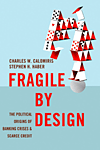Fragile by Design By Charles Calomiris & Stephen Haber
Book review: Fragile by Design, by Charles Calomiris & Stephen HaberThis is a great history of political interference in bank regulation, says James Ferguson. But a definitive analysis of the recent crisis it is not.
Get the latest financial news, insights and expert analysis from our award-winning MoneyWeek team, to help you understand what really matters when it comes to your finances.
You are now subscribed
Your newsletter sign-up was successful
Want to add more newsletters?

Twice daily
MoneyWeek
Get the latest financial news, insights and expert analysis from our award-winning MoneyWeek team, to help you understand what really matters when it comes to your finances.

Four times a week
Look After My Bills
Sign up to our free money-saving newsletter, filled with the latest news and expert advice to help you find the best tips and deals for managing your bills. Start saving today!

Two academics, Charles Calomiris and Stephen Haber, set out to uncover why some banking systems seem to be inherently unstable, while others are not. They looked at five national case studies: the UK and the US (both democracies, yet prone to crisis); Canada (virtually crisis-free); Mexico (a crisis-prone autocracy); and Brazil (a bit of both).
What they found was fascinating. Starting from the elegantly simple premise that a crisis occurs when banks hold too little capital and/or too many risky assets (pretty much the same thing), the problem, logically, must be inadequate regulation. So their thesis is that regulatory standards and credit provision are "captured" by political special interests. While democracies generally fare better than autocracies, often this is just a matter of degree. Unfortunately it seems that boom/bust cycles are woven into the very fabric of US democracy.
The strengths of the book however, are also its weaknesses. The historical narrative is gripping and cohesive, but somewhat selective, especially as we near modern times. The parts of the story that don't fit the authors' assumptions are left out. On UK banking, for example, the recent crisis merits barely a page of (largely unanswered) questions, and there is little on the role of shadow banking. While government-sponsored enterprises such as Fannie Mae in the US get solid coverage, insurer AIG, which played a central role in the crash, isn't mentioned. The experiences of individual US banks are described as "strikingly different" depending on the attitude taken to risk. Yet while post-crisis losses at Citibank (a pariah) now amount to 19% of peak loans, Bank of America (a supposed paragon) is hardly far behind on 16%.
MoneyWeek
Subscribe to MoneyWeek today and get your first six magazine issues absolutely FREE

Sign up to Money Morning
Don't miss the latest investment and personal finances news, market analysis, plus money-saving tips with our free twice-daily newsletter
Don't miss the latest investment and personal finances news, market analysis, plus money-saving tips with our free twice-daily newsletter
But the biggest criticism relates in part to the length of time the book took to write. The pair, having spent much of their careers writing on the politics and history of bank regulation, thought it would take a year to write the book. It took four. The resulting 2010-centric view gives a disproportionate weight to the role of the now-nationalised GSEs, securities in general, and subprime in particular, leading to some glaring omissions.
For example, total securities write-downs at US commercial banks hit $275bn in early 2009 but most have been written back up since. And while cumulative losses from all residential mortgages (including subprime) now exceed $120bn, this only represents about 18% of total loan losses. On the remaining 82% of loan losses, the book is silent. This is a great history of political interference in bank regulation but a definitive analysis of the recent crisis it is not.
Get the latest financial news, insights and expert analysis from our award-winning MoneyWeek team, to help you understand what really matters when it comes to your finances.
James Ferguson qualified with an MA (Hons) in economics from Edinburgh University in 1985. For the last 21 years he has had a high-powered career in institutional stock broking, specialising in equities, working for Nomura, Robert Fleming, SBC Warburg, Dresdner Kleinwort Wasserstein and Mitsubishi Securities.
-
 Should you buy an active ETF?
Should you buy an active ETF?ETFs are often mischaracterised as passive products, but they can be a convenient way to add active management to your portfolio
-
 Power up your pension before 5 April – easy ways to save before the tax year end
Power up your pension before 5 April – easy ways to save before the tax year endWith the end of the tax year looming, pension savers currently have a window to review and maximise what’s going into their retirement funds – we look at how